California and Colorado become partners, research the genetics of hemp
The University of California-Davis has partnered up with a Colorado-based biotech firm, Front Range Biosciences, to create a genomic map for industrial hemp.
The project will sequence the genes for hemp, a variety of cannabis with less than 0.3 percent tetrahydrocannabinol or THC.
“We are now excited to have the opportunity to study the genome of hemp,” viticulturist and enologist Dario Cantu said. “Decoding its genome will allow us to gain new insight into the genetic bases of complex pathways of secondary metabolism in plants.”
Cantu’s lab is in charge of the DNA sequencing and computational genetics portion of the project, whereas the Front Range Biosciences, a laboratory that specializes in breeding cannabis and providing disease-free clones to licensed cannabis operations, will handle tissue culturing, DNA extraction and funding for the project.
Front Range Biosciences and UC-Davis will be able to carry out the research thanks to the 2014 federal Farm Bill that allows hemp cultivation for research purposes as long as it is approved by the state’s agricultural department.
Front Range’s DNA samples do not contain THC or any other cannabinoid, so the firm is able to send extracted DNA samples through the mail.
“When DNA is isolated, it’s not really industrial hemp anymore,” Dan Flynn, a representative for the College of Agricultural and Environmental Science at UC-Davis, said. “When our campus council looked at it, they didn’t see an issue.”
In collaborating with the university, Front Range Biosciences aims to unlock hemp’s agricultural potential, which involves breeding cultivars that are disease, drought, and freeze resistant.
“Nobody really knows the genetics or the backgrounds of where some of these plants came from,” Jonathan Vaught, the CEO of Front Range Biosciences, said. “There’s a lot of misinformation out there. There’s been a lot of crossbreeding in the black market community over the last thirty to forty years, so it’s really difficult to know, a lot of times, what you actually have.”
Vaught said his company would create breeds of hemp with new structural properties and also design hemp that can produce specific cannabinoids, terpenes or flavonoids.
With a genomic map, cultivators can rely on traditional cross-breeding and generate new strains with specific, customized properties. Therefore, there would be no need for genetic modification techniques. Traditional breeding also requires less time and resources compared to GM methods.
Vaught added Front Range Biosciences is planning on expanding its project to include other universities’ genomic projects as well.
“I do, potentially, see us funding some research here in Colorado,” he said. “It’s a brand new genome, it’s a brand new crop. The genetic pool is very mixed up at this point, and there’s just a lot of groundwork we need to do before we can do the really exciting things that people think about with crops.”
As UC-Davis embraces cannabis as a subject for scientific study, the university also kicked off a “Physiology of Cannabis” class in the spring, aimed at teaching biology students about the interactions between cannabinoids and the human body.








